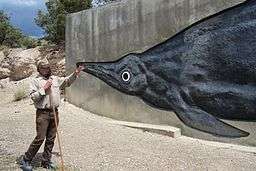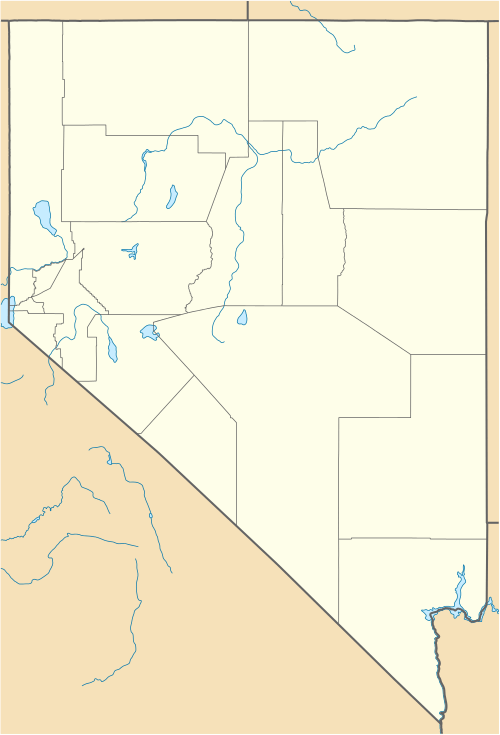Berlin–Ichthyosaur State Park
| Berlin-Ichthyosaur State Park | |
| Nevada State Park | |
 Park guide interpreting a life-size ichthyosaur image | |
| Country | |
|---|---|
| State | |
| County | Nye |
| Location | Gabbs |
| - elevation | 6,975 ft (2,126 m) [1] |
| - coordinates | 38°52′43″N 117°35′42″W / 38.87861°N 117.59500°WCoordinates: 38°52′43″N 117°35′42″W / 38.87861°N 117.59500°W |
| Area | 1,540 acres (623 ha) |
| Founded | 1957 |
| Management | Nevada Division of State Parks |
 Location of Berlin-Ichthyosaur State Park in Nevada
| |
| Designated | 1973 |
Berlin–Ichthyosaur State Park is a state park of Nevada, United States, preserving several undisturbed ichthyosaur fossils of the species Shonisaurus popularis, as well as the early-20th-century ghost town of Berlin. The 1,540-acre (620 ha) park is located 23 miles (37 km) east of Gabbs in far northwestern Nye County, approximately 150 miles (240 km) east of Reno.[2] The ichthyosaur fossils were designated a National Natural Landmark in 1973.[3]
Ichthyosaur fossils were first discovered in the area in 1928. Excavations were conducted through the 1960s, and the remains of approximately 40 ichthyosaurs were found. Until 2004, these remains included the largest ichthyosaurs ever discovered. Several specimens were left where they were found (in situ), and can be viewed by the public. These specimens are protected from the elements by a large barn. The fossils are about a 10-minute drive from Berlin Ghost Town.
Berlin, Nevada
The town of Berlin sprang up in 1896 when substantial gold veins were discovered nearby. In total, the Berlin Mine produced 42,000 troy ounces (46,080 oz; 1,306.346 kg) of gold, all removed from tunnels by hard rock mining techniques. The mine became unprofitable by 1911, and the town of Berlin became uninhabited shortly thereafter.
Today, the ore mill still stands, and the stamps and mercury float tables can be viewed. Several additional buildings still stand including residential homes, blacksmith shop, stage coach shop with attached stable, machine shop and assay office. Some buildings are open to enter, while others offer interior views of their contents through the windows. There are also headworks on some of the mine shafts.
Activities
The park offers camping, picnicking and a nature trail. Guided tours of the fossil shelter are offered from March to November. Guided mine tours, which proceed approximately 500 feet (150 m) into a tunnel that connects with the Berlin Mine, are provided by park personnel. All other access to the underground works is prohibited and considered extremely dangerous.
References
- ↑ "Berlin-Ichthyosaur State Park". Geographic Names Information System. United States Geological Survey. 1990-02-01. Retrieved 2011-04-15.
- ↑ Bryner, Jeanna (Oct 10, 2011), "Lair of Ancient 'Kraken' Sea Monster Possibly Discovered", news.yahoo.com, retrieved 2-11-11-09 Check date values in:
|access-date=(help) - ↑ "Ichthyosaur Site". nps.gov. National Park Service.
External links
| Wikimedia Commons has media related to Berlin–Ichthyosaur State Park. |